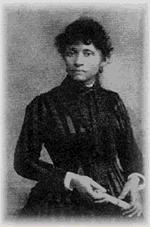

|
Albert R. Parsons Was My Friend Written shortly after Parsons' execution by his comrade Dyer Lum, who would restart Parsons' newspaper The Alarm in November, 1887. Albert R. Parsons was my friend. Among the few men to whom that word may be applied he was preeminently one. We differed on several matters; he would withstand me with the enthusiasm of an apostle, but his gentleness, his devotion to principle, his constant urbanity never betrayed him into a word of reproach. Looking back now over the past, over the discussions in days forever bygone, I record with sorrow that his chivalrous spirit did not make the impression upon my impetuosity that in a more sober, reflective mood I can now see gave him the superiority. I first met Mr. Parsons in 1879. I had known him by correspondence. His earnestness and evident sincerity impressed me at once. In the early months of 1880 he came to Washington as a delegate to a greenback-labor conference. At that time Samuel C. Hunt, of the Boston navy yard, was at the national capital trying to secure the passage of a national eight-hour law. A national eight-hour committee was formed for the purpose of furthering that work. In view of later events the names are suggestive. They were as follows: Richard F. Trevellick, of Michigan, chairman; John G. Mills (since deceased), secretary; Charles E. Litchman, Albert R. Parsons, and Dyer D. Lum, the writer. Our work was laid out to canvass congress. Mr. Trevellick received an invitation to address a political meeting in West Virginia, and excused himself. Mr. Litchman stayed one day, and was called away by "important business." Neither were seen afterward. Mr. Parsons stayed for a week at his own expense, and proved an indefatigable advocate. The other two were residents then of the capital. The zeal unostentatiously displayed on that occasion was characteristic. Without seeking prominence in print he gave his whole time to the cause. Years passed. We met occasionally and renewed old memories. After he started The Alarm I wrote him. Those who were readers of the paper under his management know how often. In September, 1886, I met him again in Cook county jail. Why he was there needs no explanation. Let me here state, without entering into the reasons for his voluntary return in expectation of receiving an impartial trial upon the charges for which he had been indicted, that at one of the last interviews I had with him he said, in response to an expression of regret on my part for that action: "No; I still believe I did right. My comrades, like myself, were unjustly charged. They did not shirk the issue; honor demanded that I should share their fate. Even under all the experience of the year past I honestly believe I could do no otherwise today! Such was Albert R. Parsons. Devoted to principle, he shirked no responsibility. "If they can afford to hang me, I can afford to die. Mine is the easier task, but they cannot humiliate me." He was not strong in physique, but his will sustained him. His only fear was that his physical organization would not bear the strain, but his indomitable mind was superior to his nervous structure. His recitation of Whittler's "Reformer" and his singing of "Annie Laurie" to the death-watch while awaiting the hour of execution showed the same spirit of calm devotion to duty which had ever characterized him under less trying circumstances. To all appeals of friends to propitiate the state by feigned submission he had but one answer: "I must be honest with myself." It is said that Grinnell meant to have made a special exception in his favor in his speech to the jury, but forgot it. One word from Gary would have saved him; It was never uttered. His later days were occupied in writing the work now in press, "Anarchism: Its Philosophy and Scientific Basis, as Defined by Some of Its Apostles." Under date of Sunday, Oct. 29, he sent me the first chapters with this note: "This manuscript has been very hurriedly prepared. I have not had time to do the subject justice, or myself, either. I began to prepare it only last week. Now, I make a solemn request of you probably a dying one-to wit: Arrange the manuscript in proper shape; go over it and correct mistakes haste may have led me to make, errors, etc. The concluding chapter, entitled The Social Revolution, will deal with strikes, boycotts, lock-outs, and use of force upon strikers, etc. in the United States and Europe. It will make clear that the revolutionist is not an anarchist; that anarchy begins when the wage system ends. It will contain choice extracts from our principal exponents." Lum. In a later letter, sent with the concluding chapter, and written only shortly before his death, he said: "The purpose of this brochure is to answer the query: The what and the wherefore of anarchism? I believe it will greatly assist in answering that question." Words fail to describe the love with which he inspired his friends. Even as the fatal hour drew near he became the comforter, the consoler. His Individuality was never more marked than when he thought he had sunk it in the cause for which he was about to die. As a friend we loved him. As a devoted husband and loving father his whole life bears testimony, Few such instances of mutual devotion have characterized married life as in his case. Upon this threshold I Pause; no strange hand can spread the curtains which covered that loving union. Come what may, I shall always be glad that I knew Albert R. Parsons. PDF scan of the original The Alarm article: https://dds.crl.edu/item/54019 |